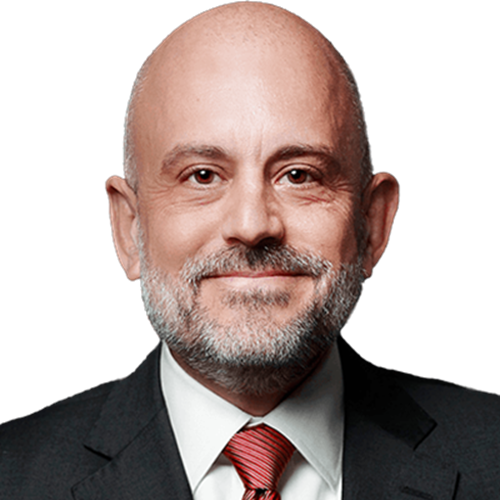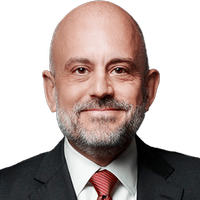For Real Financial Security, Do NOT Do What Everyone Else Is Doing
To design your ideal retirement savings portfolio, you’ve got to buck the status quo. Relying on the same old financial advice – including blindly pumping money into a 401(k) – could be a mistake. Think outside the box instead.

Profit and prosper with the best of Kiplinger's advice on investing, taxes, retirement, personal finance and much more. Delivered daily. Enter your email in the box and click Sign Me Up.
You are now subscribed
Your newsletter sign-up was successful
Want to add more newsletters?

Delivered daily
Kiplinger Today
Profit and prosper with the best of Kiplinger's advice on investing, taxes, retirement, personal finance and much more delivered daily. Smart money moves start here.

Sent five days a week
Kiplinger A Step Ahead
Get practical help to make better financial decisions in your everyday life, from spending to savings on top deals.

Delivered daily
Kiplinger Closing Bell
Get today's biggest financial and investing headlines delivered to your inbox every day the U.S. stock market is open.

Sent twice a week
Kiplinger Adviser Intel
Financial pros across the country share best practices and fresh tactics to preserve and grow your wealth.

Delivered weekly
Kiplinger Tax Tips
Trim your federal and state tax bills with practical tax-planning and tax-cutting strategies.

Sent twice a week
Kiplinger Retirement Tips
Your twice-a-week guide to planning and enjoying a financially secure and richly rewarding retirement

Sent bimonthly.
Kiplinger Adviser Angle
Insights for advisers, wealth managers and other financial professionals.

Sent twice a week
Kiplinger Investing Weekly
Your twice-a-week roundup of promising stocks, funds, companies and industries you should consider, ones you should avoid, and why.

Sent weekly for six weeks
Kiplinger Invest for Retirement
Your step-by-step six-part series on how to invest for retirement, from devising a successful strategy to exactly which investments to choose.
If you were to characterize the perfect investment, how would you describe its features? You most likely are describing something that doesn’t exist – a financial unicorn that, if it actually did exist, would do away with all other financial products. But even though it doesn’t exist as a single product, there are ways to design an ideal portfolio of products that encapsulates the features you desire; you just have to know what you’re looking for to do it.
Business coach Dan Sullivan has a saying, "Our eyes only see and our ears only hear what our brain is looking for.” In other words, to find what you’re looking for, it is essential to know what you’re looking for.
Simple concept, right? But I see people making mistakes with their money on a daily basis in my practice by overlooking options that aren’t the status quo. People default to doing things that don’t always align with what they want to achieve. Here are a few examples I’ve seen:
From just $107.88 $24.99 for Kiplinger Personal Finance
Become a smarter, better informed investor. Subscribe from just $107.88 $24.99, plus get up to 4 Special Issues

Sign up for Kiplinger’s Free Newsletters
Profit and prosper with the best of expert advice on investing, taxes, retirement, personal finance and more - straight to your e-mail.
Profit and prosper with the best of expert advice - straight to your e-mail.
- A 45-year-old business owner storing cash in a bank account earning nothing while borrowing money from a bank and paying interest to finance equipment purchases.
- A 35-year-old contributing to a retirement account at work while trying to figure out how to pay for a child’s college tuition.
- A 60-year-old holding retirement accounts in the stock market while needing a set income for their retirement plans.
- A 55-year-old devoting all available resources to paying off a mortgage while eagerly wanting to retire as soon as possible.
- A 40-year-old motivated to save and defer tax in a 401(k) while wanting to retire at age 50.
In each scenario we see people looking for financial security settling for a typically accepted path out of a desire to do “something,” but it’s most often not what they are looking for. This disconnect is a result of the continuous drumbeat of the status quo:
- Defer taxes in a 401(k).
- Store money in the bank.
- Pay off your mortgage.
This advice is repeated over and over, leading people to aimlessly follow this ideology simply due to the absence of any other obvious options.
However, these three concepts for handling money can cause more problems and difficultly for people than anything else other than debt issues. The simplicity of it makes it appealing and, on the surface, can make reasonable sense, but the results are underwhelming and mostly frustrating. Why? Because:
- If you are storing money at the bank, the bank is making money on your money while paying you next to nothing in return.
- If you are borrowing money from the bank, you are giving up control of a portion of your cash flow to repay the loan while paying the bank interest.
- And when you fund a tax-deferred account, you’re allowing the government to dictate when you can access your money – and they will have to let you know later what tax rate you will pay them since they don’t know what taxes will be in the future.
- When it comes to mortgage payoff acceleration, it is a race to zero with no wealth creation and no access to cash.
Is this how you would describe your perfect investment? Of course not, and while there is no perfect investment, you do have a choice: You can settle for the status quo, or you can think outside the box and do something different.
As I mentioned, what most savers are looking for is financial security. I define financial security as having access to cash when you need it for the rest of your life. This is easier said than done, of course, but it is where we need to begin.
There are four broad categories to consider when looking for products to accomplish this goal. Long-term growth, consistent income, access to cash and tax mitigation.
Long-Term Growth
Aside from entrepreneurship and real estate, public stock markets have the highest growth potential over the long term. But there are two other aspects to growth that savers often overlook: growth through income and the idea of uninterrupted growth.
Growth through income centers around an asset creating income to reinvest, and it is best achieved through private markets, such as real estate, private equity and private debt. There is simply too much volatility in public markets to effectively pursue a growth through income strategy. It can be done but not as effectively.
Uninterrupted growth has more to do with how money is flowing. Let me explain. When you spend money, that money is gone and no longer working for you. However, using a private banking strategy that capitalizes on the unique features of a whole life insurance policy, you can actually have money accumulating in the contract while borrowing money to make your purchases. This leveraging strategy keeps your money growing uninterrupted while accessing money through loans collateralized by the contract. In other words, you’re building wealth on money you would otherwise spend. This is one of the most underutilized strategies because most people (including insurance agents who sell insurance) don’t understand how it works.
One other thing about the insurance design … the money grows and is accessible tax-free without age restrictions. This is a big deal as you will see in a moment.
Stacking these three growth strategies together expands your diversification, reduces risk, reduces volatility and can increase your wealth more efficiently and with more control.
Consistent Income
Having consistent income ranks highest on the list of things needed to have financial security and is the primary reason traditional investments in the public stock market held inside or outside of traditional retirement accounts are less likely to be used for this purpose.
Without consistent income flowing into your checking account, you cannot effectively manage your cash flow, and if the source of that income is at risk of losing value, you add another layer of insecurity about the longevity of your income. This is a huge revelation for people, considering that the public stock market is the status quo default in retirement plans and is the least manageable of all ideas being discussed.
You cannot control the markets and therefore cannot predict the income, account value or its longevity. It’s all hypothetical to assume what stock markets will do, but supporting your cash flow needs for 30 years in retirement is not hypothetical … it’s real, and there is little margin for error.
Annuities and private market investments are best suited for income and should be the primary source for fulfilling the goal of having consistent income. You just need to know how to solve for this effectively.
Access to Cash
Having access to cash is also high on the list for financial security and is another reason traditional investment in the public stock market held inside or outside of traditional retirement accounts is not the best option for holding cash. Age restrictions, market volatility and tax liabilities are all downsides of these products, making them problematic for storing cash.
Bank accounts are another default option for storing cash, but these accounts earn close to nothing and are taxable. Those two reasons alone are motivation to find an alternative.
Again, public markets are best suited for long-term growth, and banks are best used for moving money around to pay your bills and conduct business. They are not best suited for holding cash.
A specially designed whole life insurance contract as previously mentioned is much better suited for storing cash with tax-free growth, tax-free access, consistent growth and no government age restrictions.
Tax Mitigation
Everyone desires tax mitigation, but it is mostly heard about and seldom seen in real life. The reason is simple: These strategies fall outside the status quo. People mistakenly think tax deferral is a tax mitigation method, but in actuality it is the primary source of tax problems in retirement.
It is a paradox that people who defer taxes with 401(k)s, IRAs and other similar retirement accounts think they are saving on taxes – because they are actually causing a larger tax problem for themselves. True tax savings is not tax deferral. Tax deferral just kicks the can down the road.
If you are already in a situation where you have a large amount of money in tax-deferred accounts and are looking for strategies to convert taxable assets to tax-free, then you will want to work with a team of experts who can help guide you through what is being discussed in this article.
The process for this is situational and has no magic formula for the masses, but I do want to state that this isn’t simply advice for a Roth conversion. A Roth conversion can certainly be part of a tax-mitigation strategy to prevent the problem from expanding into the future, but we must first attempt to minimize the taxes of the conversion.
Conclusion for Designing Your Ideal Investment Portfolio
The status quo will have you believe that there is nothing more to learn and that trusting banks and the government is in your best interest. As ridiculous as this may sound to you, deferring taxes in a 401(k), storing money in the bank, and accelerating the payoff of your mortgage is exactly what defines status quo.
The biggest challenge is to remain open-minded and consider the fact that there is a better way. There is a saying that goes, your brain is like a parachute; it only works when it is open.
If you wish to learn whether what the ultra-wealthy are doing can work for you, complete the Family Office Quiz at TakeBriansQuiz.com to see if you qualify.
Securities offered through Kalos Capital Inc., Member FINRA/SIPC/MSRB and investment advisory services offered through Kalos Management Inc., an SEC registered Investment Advisor, both located at 11525 Park Wood Circle, Alpharetta, GA 30005. Kalos Capital Inc. and Kalos Management Inc. do not provide tax or legal advice. Skrobonja Financial Group LLC and Skrobonja Insurance Services LLC are not an affiliate or subsidiary of Kalos Capital Inc. or Kalos Management Inc.
Securities offered only by duly registered individuals through Madison Avenue Securities, LLC. (MAS), Member FINRA & SIPC. Advisory services offered only by duly registered individuals through AE Wealth Management (“AEWM”), a registered investment adviser. Skrobonja Financial Group, LLC, Skrobonja Insurance Services, LLC, AEWM and MAS are not affiliated entities. The article and opinions in this publication are for general information only and are not intended to provide specific advice or recommendations for any individual. We suggest that you consult your accountant, tax or legal adviser with regard to your individual situation.
Profit and prosper with the best of Kiplinger's advice on investing, taxes, retirement, personal finance and much more. Delivered daily. Enter your email in the box and click Sign Me Up.

Brian Skrobonja is a Chartered Financial Consultant (ChFC®) and Certified Private Wealth Advisor (CPWA®), as well as an author, blogger, podcaster and speaker. He is the founder and president of a St. Louis, Mo.-based wealth management firm. His goal is to help his audience discover the root of their beliefs about money and challenge them to think differently to reach their goals. Brian is the author of three books, and his Common Sense podcast was named one of the Top 10 podcasts by Forbes. In 2017, 2019, 2020, 2021 and 2022, Brian was awarded Best Wealth Manager. In 2021, he received Best in Business and the Future 50 in 2018 from St. Louis Small Business.
-
 Dow Adds 1,206 Points to Top 50,000: Stock Market Today
Dow Adds 1,206 Points to Top 50,000: Stock Market TodayThe S&P 500 and Nasdaq also had strong finishes to a volatile week, with beaten-down tech stocks outperforming.
-
 Ask the Tax Editor: Federal Income Tax Deductions
Ask the Tax Editor: Federal Income Tax DeductionsAsk the Editor In this week's Ask the Editor Q&A, Joy Taylor answers questions on federal income tax deductions
-
 States With No-Fault Car Insurance Laws (and How No-Fault Car Insurance Works)
States With No-Fault Car Insurance Laws (and How No-Fault Car Insurance Works)A breakdown of the confusing rules around no-fault car insurance in every state where it exists.
-
 For the 2% Club, the Guardrails Approach and the 4% Rule Do Not Work: Here's What Works Instead
For the 2% Club, the Guardrails Approach and the 4% Rule Do Not Work: Here's What Works InsteadFor retirees with a pension, traditional withdrawal rules could be too restrictive. You need a tailored income plan that is much more flexible and realistic.
-
 Retiring Next Year? Now Is the Time to Start Designing What Your Retirement Will Look Like
Retiring Next Year? Now Is the Time to Start Designing What Your Retirement Will Look LikeThis is when you should be shifting your focus from growing your portfolio to designing an income and tax strategy that aligns your resources with your purpose.
-
 I'm a Financial Planner: This Layered Approach for Your Retirement Money Can Help Lower Your Stress
I'm a Financial Planner: This Layered Approach for Your Retirement Money Can Help Lower Your StressTo be confident about retirement, consider building a safety net by dividing assets into distinct layers and establishing a regular review process. Here's how.
-
 The 4 Estate Planning Documents Every High-Net-Worth Family Needs (Not Just a Will)
The 4 Estate Planning Documents Every High-Net-Worth Family Needs (Not Just a Will)The key to successful estate planning for HNW families isn't just drafting these four documents, but ensuring they're current and immediately accessible.
-
 Love and Legacy: What Couples Rarely Talk About (But Should)
Love and Legacy: What Couples Rarely Talk About (But Should)Couples who talk openly about finances, including estate planning, are more likely to head into retirement joyfully. How can you get the conversation going?
-
 How to Get the Fair Value for Your Shares When You Are in the Minority Vote on a Sale of Substantially All Corporate Assets
How to Get the Fair Value for Your Shares When You Are in the Minority Vote on a Sale of Substantially All Corporate AssetsWhen a sale of substantially all corporate assets is approved by majority vote, shareholders on the losing side of the vote should understand their rights.
-
 How to Add a Pet Trust to Your Estate Plan: Don't Leave Your Best Friend to Chance
How to Add a Pet Trust to Your Estate Plan: Don't Leave Your Best Friend to ChanceAdding a pet trust to your estate plan can ensure your pets are properly looked after when you're no longer able to care for them. This is how to go about it.
-
 Want to Avoid Leaving Chaos in Your Wake? Don't Leave Behind an Outdated Estate Plan
Want to Avoid Leaving Chaos in Your Wake? Don't Leave Behind an Outdated Estate PlanAn outdated or incomplete estate plan could cause confusion for those handling your affairs at a difficult time. This guide highlights what to update and when.
